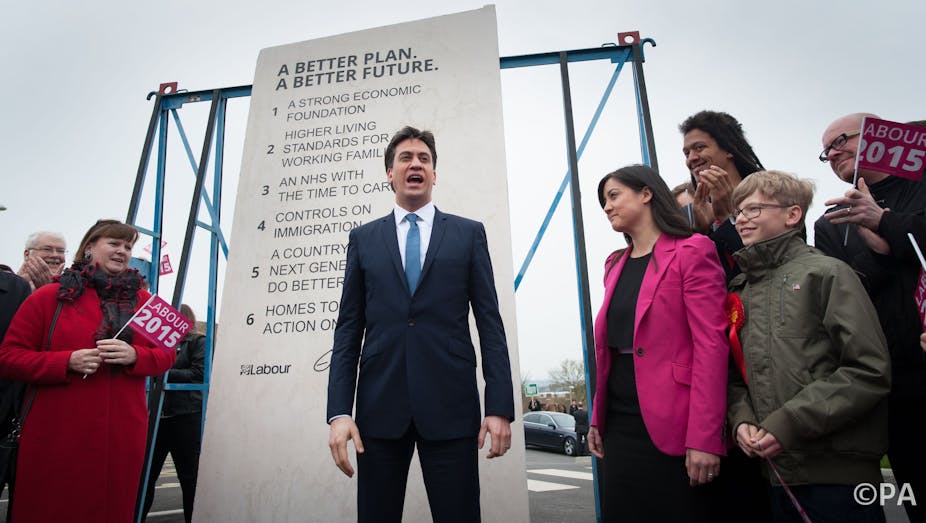Labour leader Ed Miliband has taken what many have seen as an odd decision by setting his party’s main election promises quite literally in stone.
Over the final weekend before polling day, Miliband unveiled the eight-foot tablet with Labour’s six pledges chiseled into its surface. He has suggested it could be placed in the garden of Downing Street if he is elected as the next prime minister – although the people in charge of granting planning permission in Westminster may have other ideas.
The Ed Stone, as it is fast becoming known on social media, is exactly the opposite of what a modern politician needs to do in election campaigns. Far from committing to concrete (or stone) pledges, they need to shape-shift. But Miliband and his cohort are victims of an unforgiving electorate that won’t let them make u-turns.
Most politicians are, of course, natural shape-shifters. They change policies, often along with the way they present or perform themselves, depending on their audiences and the political constraints and openings facing them.
And the campaign up to May 7 may only be the beginning. The protracted, multi-party negotiations likely to follow an indecisive electoral outcome will be a stage for taking on and discarding policy and rhetorical stances as parties manoeuvre for power. Miliband will not want to lug his stone to the negotiating table.
The dangers of shape-shifting
Shape-shifting leaves a politician open to ridicule when it is detected or done badly. Nick Clegg’s policy switch on tuition fees is an examples of what happens when you don’t shape shift with finesse. It can be politically damaging.
UK party leaders know the dangers and seem to be doing all they can to protect themselves from accusations of not sticking to their original plans. Ahead of the 2015 election, David Cameron has pledged a tax lock – a law to be passed in the first 100 days of a new government to prevent income tax, national insurance or VAT increases during the next parliament.
And then came the Ed Stone. A giant symbol of how committed Miliband is to his six key pledges on the economy, the NHS and immigration, among other things. Of course, holding a Labour or Labour-led government to the pledges might be tricky. How do we know, for example, when we have “An NHS with the time to care”?
Like Ulysses tethered to the mast to stop him answering the call of the sirens, Cameron and Miliband are saying “Don’t trust me – trust the ropes tying my hands”. They don’t want to be the Nick Clegg of the 2015 election and have to spend the next five years apologising.
Freedom to swerve
But perhaps Ed’s stone should remind us to be more sympathetic when leaders change their course. His gesture has not been treated kindly, but the fate that would befall him if he broke his promises would perhaps be just as bad.
Today’s politicians must, it seems, claim consistency and authenticity at all times. But being a good or moral representative may require inconsistency. Good and moral ends may demand flexible means, perhaps multiple role-playing to diverse, demanding and sceptical electorates.
The argument that shape-shifting damages or demeans democratic representation is not as strong as many think. Political representatives often need to be, or to appear to be, different things to different people. They may choose to do so, or be constrained by circumstance. Machiavelli understood this well: a prince, he argued, “should have a flexible disposition, varying as fortune and circumstance dictate”.
We have plenty of examples of venerated shape-shifters. Former Brazilian president, Luiz Inácio Lula da Silva, went from local to national union official, to co-organiser of the Workers Party, to congressman, to multiple presidential candidate to two-term president, shifting from radicalism to reformism.
And according to journalist Bill Keller, Nelson Mandela was at various times:
A black nationalist and a nonracialist, an opponent of armed struggle and a practitioner of armed struggle, a close partner of the South African Communist Party and, in his presidency, a close partner of South Africa’s powerful capitalists. In other words, he was whatever served his purpose of ending South Africa’s particularly fiendish brand of minority rule.
Perhaps we need our representatives or leaders to be shape-shifters. More positions adopted may mean more possibilities exist in our public debates, making them richer. But perhaps also we need our hypocrisy to be catered to – if representatives shape-shift, we want them to do so with such skill that we don’t have to notice and call them out.
As coalition-building proceeds, the tensions between an image of consistency and authenticity, on the one hand, and the pragmatic demands on politicians that a divided electorate imposes upon them, on the other hand, will be fascinating. Maybe we should be more forgiving observers than is normally the case, and be relaxed if the Ed Stone does not set a trend – or if the promises carved in it do not come to pass.

